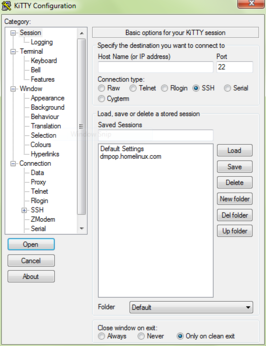Manage Remote Linux Machines from Windows Using KiTTY

Productivity Sauce
Need to connect to a remote Linux machine or server from a Windows computer? Then KiTTY is your best friend. This Telnet and SSH client is a fork of the popular PuTTY tool that offers several useful improvements.
For starters, KiTTY sports the portability mode which allows you to run the tool on a Windows machine without leaving any traces. To enable the portability mode, create a kitty.ini file in the same location as KiTTY, and add the following lines to the file:
[KiTTY] savemode=dir
KiTTY can save multiple session profiles, and the utility allows you to group sessions into folders, which can be useful for keeping tabs on profiles. The ability to handle URLs is another of KiTTY's handy features, and you can configure how the utility should treat links in the Window | Hyperlinks section.
Tired of entering login credentials every time you connect to a remote machine? KiTTY got you covered: in the Connection | Data section, you can specify auto-login details, and the utility uses them to log you in automatically when you connect to a remote machine.
KiTTY also lets you temporarily disable keyboard input to avoid accidental typing, and you can use the Ctrl+F9 keyboard shortcut to toggle keyboard input.
These are just a few of KiTTY's highlights, but the utility has a raft of other neat features that make it a perfect tool for managing remote Linux machines.
comments powered by DisqusSubscribe to our Linux Newsletters
Find Linux and Open Source Jobs
Subscribe to our ADMIN Newsletters
Support Our Work
Linux Magazine content is made possible with support from readers like you. Please consider contributing when you’ve found an article to be beneficial.

News
-
Chaos Comes to KDE in KaOS
KaOS devs are making a major change to the distribution, and it all comes down to one system.
-
New Linux Botnet Discovered
The SSHStalker botnet uses IRC C2 to control systems via legacy Linux kernel exploits.
-
The Next Linux Kernel Turns 7.0
Linus Torvalds has announced that after Linux kernel 6.19, we'll finally reach the 7.0 iteration stage.
-
Linux From Scratch Drops SysVinit Support
LFS will no longer support SysVinit.
-
LibreOffice 26.2 Now Available
With new features, improvements, and bug fixes, LibreOffice 26.2 delivers a modern, polished office suite without compromise.
-
Linux Kernel Project Releases Project Continuity Document
What happens to Linux when there's no Linus? It's a question many of us have asked over the years, and it seems it's also on the minds of the Linux kernel project.
-
Mecha Systems Introduces Linux Handheld
Mecha Systems has revealed its Mecha Comet, a new handheld computer powered by – you guessed it – Linux.
-
MX Linux 25.1 Features Dual Init System ISO
The latest release of MX Linux caters to lovers of two different init systems and even offers instructions on how to transition.
-
Photoshop on Linux?
A developer has patched Wine so that it'll run specific versions of Photoshop that depend on Adobe Creative Cloud.
-
Linux Mint 22.3 Now Available with New Tools
Linux Mint 22.3 has been released with a pair of new tools for system admins and some pretty cool new features.

